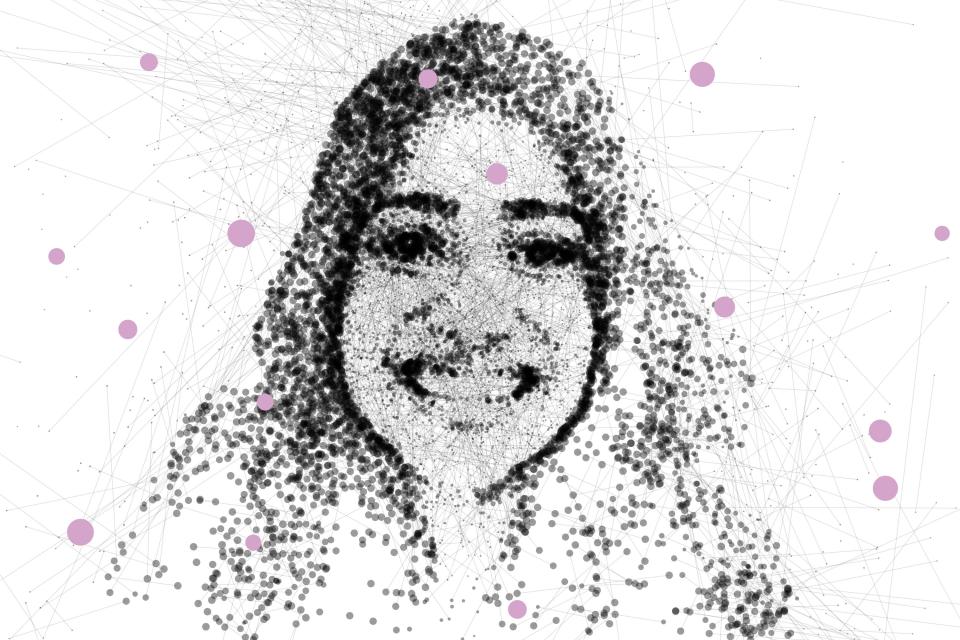Radical Proposal: Data Cooperatives Could Give Us More Power Over Our Data

Divya Siddarth | Art created using code by Sergio Albiac
We have a major power imbalance in our digital economy. People who produce data—i.e., all of us who use the internet—have essentially no power or control over our data, as well as very little understanding of how and by whom it is being used, says Divya Siddarth, an associate political economist and social technologist at Microsoft Corp., and a researcher at the Ostrom Workshop and the RadicalxChange Foundation. Meanwhile, a few organizations with overwhelming economic and political power have taken ownership of our data and are profiting from it, challenging meaningful democratic participation and monopolizing what could otherwise be shared benefits.
As a result of this imbalance, the data economy is ruled by unfair competition, which stifles the productive, innovative, and collaborative use of our data, Siddarth says. Meanwhile, she says, ordinary people are manipulated via advertising and other means, and their privacy is violated—yet they have no means of either benefiting from sharing their data or opting out of the data economy.
To address these problems, Siddarth and her colleagues propose creating data cooperatives that would function as intermediary fiduciaries who would negotiate with companies and other entities to establish guidelines around the use of our shared data; set limits on who can view, store, use, or buy it; and route the benefits back to us: in dollar form, in-kind, or through recognition and access.
The concept springs from the realization that most data is collectively created, rather than individual property: Every Facebook post, Twitter feed, and email involves multiple individuals. As a result of this fundamental insight, Siddarth says, “not only do our rights over data need to be collective, but also our solutions for data governance as well.”
Siddarth presented a data cooperatives proposal at Stanford HAI’s “Policy and AI: Four Radical Proposals for a Better Society” conference, held Nov. 9-10, 2021. Watch the full presentation below.
Data Cooperatives: What Are They?
The data cooperatives proposal starts from the premise that our data is fundamentally collective rather than private property, Siddarth says. Consider who owns a series of emails involving a sender, receiver, and multiple people cc’d. Or who in the social media context owns posts that are widely shared or photos that are tagged with multiple people’s names. “Because the data we’re creating is fundamentally shared,” Siddarth says, “collective structures like data cooperatives are the appropriate vehicle to negotiate on behalf of data holders like you and me.”
Data cooperatives would function as fiduciaries on our behalf, just as financial advisors and CPAs do, Siddarth says. “Just as we trust these fiduciaries with our sensitive information, we would do the same with data cooperatives.”
Read all the proposals:
Universal Basic Income to Offset Job Losses Due to Automation
Middleware Could Give Consumers Choices Over What They See Online
Several existing organizations exemplify how data cooperatives could work. Driver’s Seat Cooperative, for example, is an app-based ride-hailing platform with a dataset shared by the drivers. Data coalitions in Taiwan and elsewhere own the data generated by distributed air and water pollution sensors—data that the public, private, and civil sectors have used to design interventions and products to mitigate pollution problems. And organizations like Wikipedia function as data commons in that many people contribute data and knowledge into the pool. “In small ways these cooperative structures are already succeeding,” Siddarth says.
Siddarth and her colleagues have already done some advocacy work on this idea that they have circulated with legislators and policymakers in the EU and the US, as well as the initial draft of the Data Freedom Act, written by RadicalxChange Foundation President Matthew Prewitt, economist Glen Weyl, and others.
Challenges to Making Data Cooperatives a Reality
For a set of accountable and responsible intermediary institutions to exist, people in power will first have to understand and agree that cooperative data ownership is appropriate and beneficial.
Proponents will also have to jump multiple technological, economic, regulatory, and social hurdles. We need reliable and secure ways to track the source of data as it is transferred and stored as well as privacy-preserving machine learning methods for pooling data and unlocking insights from it, Siddarth says. We’ll also need regulations regarding privacy, data reuse and deletion, data interoperability, and portability. And if some data cooperatives hope to be compensated for data that companies now use for free, we will need to deal with pricing questions and establish ways for data intermediaries to obtain and distribute that compensation. And most important, there is a need to establish trust in these intermediaries as fiduciaries, which will require the implementation of meaningful and accountable democratic decision-making processes.
And finally, data cooperatives need to be one piece of a broader digital commons, Siddarth says. “We need a shared public infrastructure that will allow a much broader group of communities and organizations to build on top of the assets we have, and also allow many more people to have a voice in the tech ecosystem.”
“For data cooperatives to happen at scale, there needs to be a concerted effort across all of these fronts,” Siddarth says.
Watch the Presentation
Stanford HAI's mission is to advance AI research, education, policy and practice to improve the human condition. Learn more.